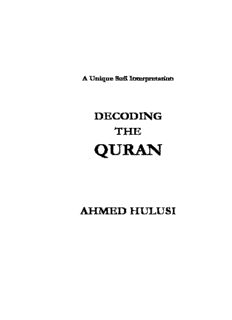Table Of ContentA Unique Sufi Interpretation
DECODING
THE
QURAN
AHMED HULUSI
This book may be freely printed, reproduced, published and
translated as long as it remains faithful to the original and not for
the purpose of profit. For the knowledge of ALLAH, there is no
recompense.
Copyright © 2013 Ahmed Hulusi
All rights reserved.
ISBN-10: 0615867650
ISBN-13: 978-0615867656
A Unique Sufi Interpretation
DECODING
THE
QURAN
AHMED HULUSI
www.ahmedhulusi.org/en/
Translated by ALIYA ATALAY
Translator’s Note
“I am the city of knowledge and Ali is its gate;
so whoever desires
knowledge,
let him enter the gate.”
(Muhammad saw)
“The secret of the Quran is in al-Fatiha, the secret of al-Fatiha is in the
Basmalah,
and the secret of the Basmalah is in the letter B (ب).
And I am the POINT beneath the ‘B’ (ب)!”
( Ali ra)
When Hadhrat Ali (ra) made this statement he was probably
not referring to a cryptograph. Nor was he presenting a code or a
cypher in the literal sense. He was, however, shedding light on a
paramount code – the encodement of existence.
By positing that the entire Quran is contained in a single letter,
and depicting himself as a point comprising it, Hadhrat Ali (ra)
effectively alludes to what modern science has come to theorize as
the ‘holographic universe.’ In other words, the whole is contained
in the part; each and every iota of existence potentially contains
the whole, and what we label as the ‘whole’, or the ‘outside world’,
is our hologram. That is, we live in the virtual projection of our
own perceptions and beliefs, which consequently nullifies the
concept of ‘other’, thus endorsing the non-duality of existence.
So, if the universe is contained in the Quran, and the Quran is
contained in the ‘point’, we, every single one of us, are encrypted
‘points’ of micro universes, containing within us the infinite
vastness of endless potentiality.
It is this principle upon which Ahmed Hulusi establishes his
interpretation of the Quran, drawing the attention to the self and
the Self rather than things or god/s ‘out there.’ Taking special note
of words that begin with the letter B, he construes their meanings
introspectively, directing the reader to turn inward for their
rendition.
Although the masculine pronoun ‘He’ was unavoidable, it is
needless to say ‘Allah’ – the infinite consciousness beyond all
preconceived and preconditioned ideas – transcendentally and
indubitably surpasses any gender or form. As such, it is important
to keep in mind that ‘Allah’ is a name that encompasses all the
Names, qualities and attributes – the manifest and the unmanifest
– pertaining to existence and nonexistence.
Though some key words such as Rabb and Rasul have been
used in their original form, as no English counterpart adequately
captures their meanings, I have devised a glossary (included at the
end) explaining what they mean according to Ahmed Hulusi, in
hope of aiding their correct understanding.
When Ahmed Hulusi shared with me a copy of his Turkish
Quran four years ago at a ‘coincidental’ meeting, my first response
was to ask him if there was an English version, to which he
answered, “Perhaps you will translate it!” At the time, I had no
such intentions or any involvement in literary translations, so I
laughed his comment off. Two years later, fate had me translating
his book, The Observing One. Since then I have had the honor of
translating five of his books, followed by Decoding the Quran,
which took just over a year to complete. I am unable to express
my gratitude enough to have had the blessed opportunity to work
on such a unique interpretation of the Quran with such a fabulous
team, especially Guner Turkmen and Onder Tuncay, whose
exceptional support has been invaluable to the completion of this
project.
As I write this note on this revered night of Ramadan, I ask
that you forgive me for any inadequacies and/or mistakes I may
have made, for all imperfections pertain to me, while it is the
countenance of the eternal One who is perfect.
May the key of the letter B unlock our selves to our Selves…
“Indeed, when He wills a thing, His command is ‘B’e… and it
is!” (36:82)
Aliya Atalay
Sydney, 2013
CONTENTS
Introductory Informatıon To Understandıng The Quran ... 1
An Important Note About Understandıng ‘Decodıng The
Quran’ ..................................................................... 9
Decodıng The Quran ................................................. 11
An Essentıal Message ............................................... 23
The Exalted, Magnıfıcent And Perfect Qualıtıes Of The
Names Of Allah (Al-Asma Ul-Husna) ...................... 25
1. Al-Fatiha ........................................................... 49
2. Al-Baqarah ......................................................... 51
3. Ali-Imran ........................................................... 89
4. An-Nisa ........................................................... 112
5. Al-Ma’idah ....................................................... 132
6. Al-An’am ......................................................... 147
7. Al-A’raf ........................................................... 165
8. Al-Anfal .......................................................... 187
9. At-Tawbah ....................................................... 196
10. Yunus ............................................................. 211
11. Hud ............................................................... 223
12. Yusuf ............................................................. 235
13. Ra’d ............................................................... 246
14. Ibrahim .......................................................... 253
15. Al-Hijr .......................................................... 259
16. An-Nahl ........................................................ 266
17. Al-Isra ........................................................... 278
18. Al-Kahf .......................................................... 289
19. Maryam .......................................................... 300
20. Ta-Ha ............................................................ 308
21. Al-Anbiya ...................................................... 320
22. Al-Hajj .......................................................... 329
23. Al-Mu’minun .................................................. 338
24. An-Nur .......................................................... 347
25. Al-Furqan ...................................................... 355
26. Ash-Shu’ara .................................................... 362
27. An-Naml ........................................................ 376
28. Al-Qasas ........................................................ 384
29. Al-Ankabut .................................................... 393
30. Ar-Rum .......................................................... 400
31. Luqman .......................................................... 406
32. As-Sajda ........................................................ 410
33. Al-Ahzab ....................................................... 414
34. As-Saba ......................................................... 422
35. Fatir .............................................................. 428
36. Ya-Sin ........................................................... 434
37. As-Saffat ........................................................ 440
38. Saad .............................................................. 451
Description:“The secret of the Quran is in al-Fatiha, the secret of al-Fatiha is in the Though some key words such as Rabb and Rasul have been used in their

